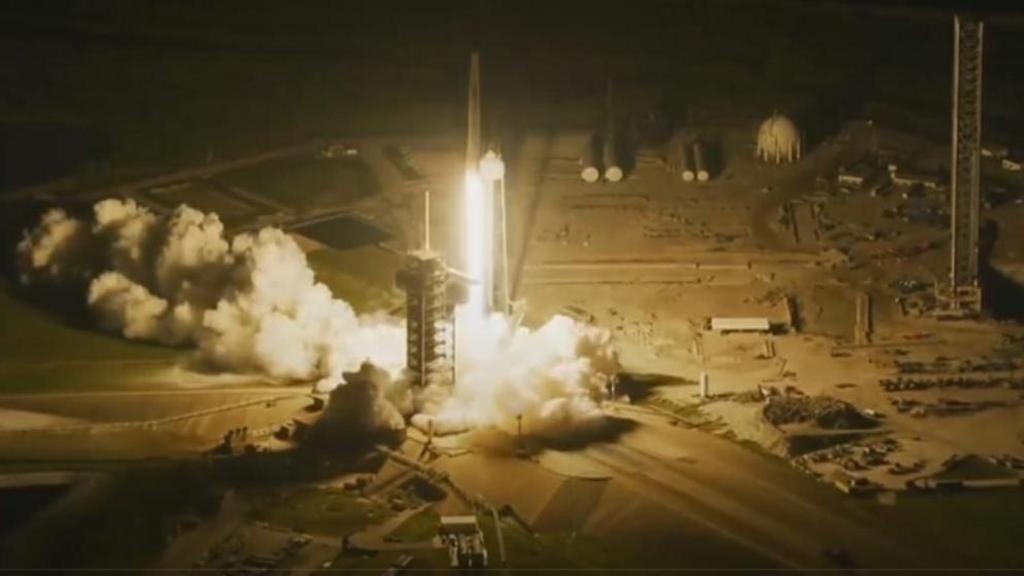Celebrations have erupted across India following the successful launch of the Axiom-4 (Ax-4) mission, which includes an Indian astronaut as part of its multinational crew.
Group Captain Shubhanshu Shukla, the mission’s pilot, has become only the second Indian to journey into space.
In approximately 26 hours, upon the spacecraft’s docking with the International Space Station (ISS), Group Captain Shukla will become the first Indian to visit NASA’s orbiting laboratory.
This mission marks a significant milestone, occurring 41 years after cosmonaut Rakesh Sharma’s pioneering flight aboard a Russian Soyuz spacecraft in 1984.
Ax-4, led by veteran astronaut and former ISS commander Peggy Whitson, who has accumulated over 675 days in space and completed 10 spacewalks, launched from NASA’s Kennedy Space Center in Florida at 02:31 EDT (06:31 GMT; 12:01 India time) on Wednesday.
The Ax-4 mission, a commercial venture operated by Axiom Space, a Houston-based private company, represents a collaborative effort between NASA, the Indian Space Research Organisation (ISRO), the European Space Agency (ESA), and SpaceX.
The four-member crew also includes Slawosz Uznanski-Wisniewski from Poland and Tibor Kapu from Hungary, marking their nations’ return to space after more than four decades. The astronauts underwent weeks of quarantine prior to Wednesday’s launch.
The flight has garnered considerable interest in India, with ISRO emphasizing that Group Captain Shukla’s experience on the ISS will significantly contribute to its space endeavors.
The 39-year-old was among four Indian Air Force officers selected last year for the country’s inaugural human spaceflight, planned for 2027. India has also unveiled ambitious plans to establish a space station by 2035 and send an astronaut to the Moon by 2040.
ISRO has invested 5 billion rupees ($59 million; £43 million) to secure Group Captain Shukla’s seat on Ax-4 and his subsequent training, as part of its preparations for future space missions.
Shortly after liftoff, Group Captain Shukla conveyed a message to India.
“We’re back in space after 41 years, and what an amazing ride it’s been,” he stated.
“Currently, we are orbiting Earth at a velocity of 7.5km per second. I carry the Indian flag with me. This is not merely the beginning of my journey to the ISS, but the commencement of India’s human spaceflight program. I invite all my fellow Indians to partake in this journey and share in the pride and excitement.”
The launch, utilizing the SpaceX Crew Dragon capsule atop a Falcon 9 rocket, was broadcast live by Axiom Space and NASA, sparking jubilant celebrations across India.
Prime Minister Narendra Modi celebrated the successful launch, stating that the Indian astronaut “carries with him the wishes, hopes, and aspirations of 1.4 billion Indians.”
In Group Captain Shukla’s hometown of Lucknow, his parents joined hundreds of students to witness the launch. Upon their arrival at the school, they were greeted by a music band and were seen applauding as the rocket ascended.
Born on October 10, 1985, in Lucknow, Group Captain Shukla joined the Indian Air Force as a fighter pilot in 2006.
He has piloted MiGs, Sukhois, Dorniers, Jaguars, and Hawks, accumulating over 2,000 hours of flight experience.
Describing the past year as “nothing short of transformative,” Group Captain Shukla recently expressed his excitement during an online press conference.
“It has been an amazing journey so far, but the best is yet to come,” he said.
“As I go into space, I carry not just instruments and equipment, I carry hopes and dreams of a billion hearts.”
“I request all Indians to pray for the success of our mission,” he added.
In addition to piloting the mission, the Indian astronaut will have a demanding schedule during his two-week stay on the ISS.
Given the widespread interest in the flight, ISRO has announced plans to organize events for him to engage with Indian students and address their questions while in space. A meeting with Prime Minister Narendra Modi is also anticipated.
The four-member crew will dedicate most of their time to conducting 60 scientific experiments, with seven originating from India.
According to former NASA scientist Mila Mitra, ISRO’s experiments will enhance our understanding of space and its effects on biology and microgravity.
One of the key experiments, she explained, will examine the impact of spaceflight on six varieties of crop seeds.
Another ISRO experiment involves cultivating three strains of microalgae, which have potential applications in food, fuel, or even life support systems, with the aim of identifying the most suitable strains for growth in microgravity, she added.
The ISRO projects will also investigate how tardigrades, microscopic animals on Earth known for their ability to withstand extreme conditions, fare in space.
Further experiments aim to determine the mechanisms behind muscle loss in space and potential treatments, as well as the physical and cognitive effects of using computer screens in microgravity.
Fixtures for India’s five-Test tour of England.
Former England captain and BBC Sport pundit Michael Vaughan says England “could be in for a special ride” following their incredible 371-run chase and five-wicket victory over India in the first Test at Headingley.
The prototype test developed in Devon could help save patients suffering from black fungus disease.
On this day 50 years ago, then prime minister Indira Gandhi declared Emergency, suspending rights and jailing rivals.
India will not change from their plan to play star bowler Jasprit Bumrah in only three of the five Tests against England this summer, says coach Gautam Gambhir.

